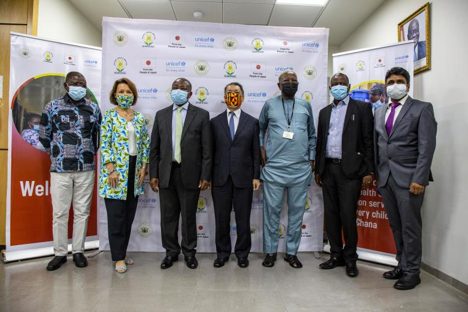Government has assured development partners, UNICEF and the Japanese government of its commitment to Universal Health Coverage in the country.
Health Minister Mr. Kwaku Agyeman Manu noted that UNICEF and the government of Japan provided resources for Ghana’s COVID-19 vaccination programme through the provision of equipment and training to the Noguchi Memorial Institute for Medical Research (NMIMR).
Giving further details, Kwaku Agyeman Manu noted that the health sector also benefitted from Technical Support and Grant Aid from the Japanese government, while UNICEF helped with improving Maternal, Neonatal, Child and Adolescent Health.
Mr. Agyeman Manu spoke at an event to aimed at strengthening the partnerships under the theme ‘Celebrating successful partnership for quality maternal and child care and COVID-19 prevention’. According to him, “So far, a little over 1.2 million Ghanaians have been vaccinated against COVID-19 out of the 20 million target defined in our National Vaccine Deployment Plan”.
He added that during the COVID-19 pandemic access to testing facilities are also being enhanced with the support provided to the Noguchi Memorial Institute of Medical Research, which places the Institute at the forefront of detecting the virus.
Mr. Agyeman Manu also revealed that maternal and child health services are not greatly affected by the COVID-19 pandemic, as a result of the investments made through the partnership. “Government is also aware of the upcoming grant to provide ultra-cold chain equipment for vaccine storage to enhance vaccination. This feat will not only improve our vaccine storage infrastructure but also increase access and expand the scope and variety of vaccines which can be made available to Ghanaians as we race toward attaining herd-immunity,” he said.
He expressed appreciation to the partners, saying: “The recently installed COVID-19 testing and diagnostic equipment, even before other machines at the Eastern Regional Hospital, has contributed to the testing capacity for Ghana and reduced the waiting period for test results from several days to a few hours”.
On his part, Mr. Tsutomu Himeno, the Japanese Ambassador to Ghana, commended government for enhancing the strong bilateral relationship with the Japanese government. He assured that the government of Japan will continue to support Ghana in fighting the COVID-19 pandemic.
“We are happy with the collaboration in health and nutrition, maternal, and child health issues, and building a solid foundation for health service delivery. We also commend the UNICEF for their proven record of reliability as an encouragement for Japan to continue entrusting and investing our resources to support others.”
Also present was the Country Representative of UNICEF, Anne-Claire Dufay – who commended the Ministry of Health and Ghana Health Service for their strong leadership and commitment to fight against the COVID-19 pandemic.
She said: “There have been major challenges in maintaining essential health and nutrition service delivery during the early months of the crisis. You have stepped up to this daunting task. After an initial slow-down, most essential health and nutrition services have recovered,” she said.
According to her, since March 2020 more than 500,000 children and women have been immunised against preventable diseases, or benefitted from pre- and post-natal care, as well as had services provided for survivors of gender-based violence.
“More than 120,000 children have benefitted from micro-nutrient powders to reduce anaemia, while 50 schools and 10 healthcare facilities now have water and sanitation equipment – all due to the strategic partnerships,” she said.
Madam Dufay revealed that the PCR machine has become operational at the Eastern Regional Hospital and more than 7,000 health workers were trained.
“In addition, thanks to the people of Japan, UNICEF will now procure and ship ultra-cold chain equipment to Ghana, which is essential for some vaccines to be stored at very low temperatures. We will also support accompanying training for government to store and deploy COVID-19 vaccines to reach greater population immunity.
“It is a timely and much-needed contribution, as the ultra-cold chain will expand possibilities to receive vaccines, including through the COVAX facility (CEPI, GAVI, UNICEF, WHO)” Anne-Claire Dufay assured.










